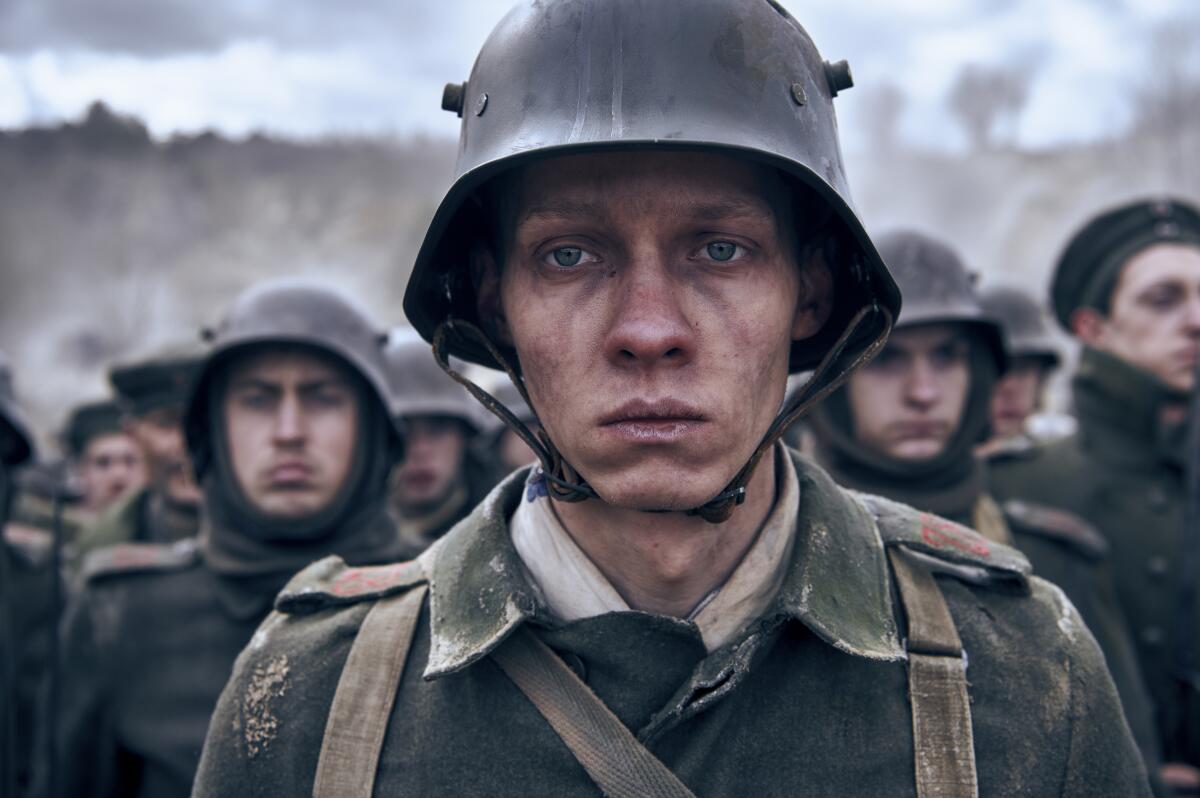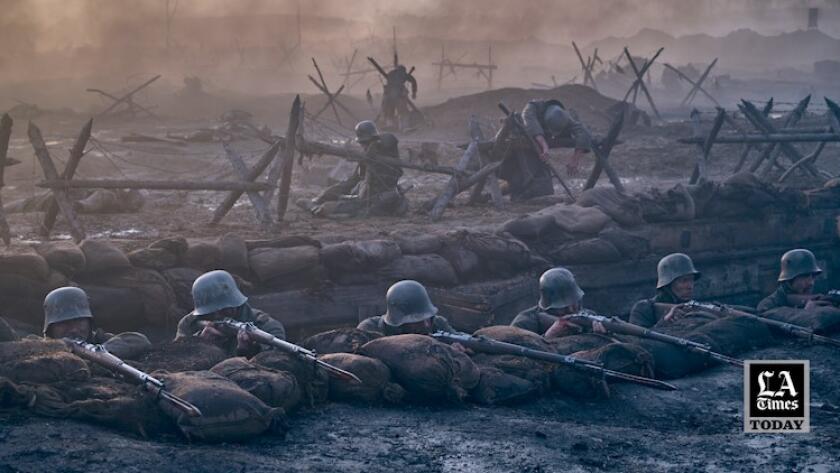War is hell (again) in Netflix’s new adaptation of ‘All Quiet on the Western Front’

- Share via
“All Quiet on the Western Front,” directed by Edward Berger, is hardly the first movie to argue — quite persuasively — that war is hell. It is, however, the first filmed adaptation of Erich Maria Remarque’s seminal World War I novel in which the Germans actually speak German. The book’s prior screen incarnations — Lewis Milestone’s Oscar-winning 1930 film, Delbert Mann’s 1979 telefilm — featured platoons of English-speaking actors cast as men with names like Kropp, Müller and Tjaden, a choice that made for some cognitive dissonance but scarcely mitigated their dramatic power or purpose. And that purpose — to de-glorify the horrors of trench warfare, mock the foolish vanity of nationalism and condemn the futility and cruelty of mass death — is one that should transcend barriers of language and culture anyway.
Even so, this solid, stirring new adaptation, which will represent Germany in the Oscar race for international feature, sets a noteworthy precedent. There’s an undeniable power in seeing Remarque’s once-serialized novel — an antiwar statement so definitive that it was duly banned by the Nazis a few years after its 1929 publication — brought to the screen in its original tongue. The sight of actual German actors in these roles can only lend authority to Remarque’s lament for a generation of men — his generation — who were “destroyed by the war,” even as it serves to bolster the movie’s horrifyingly visceral realism.
For your safety
The Times is committed to reviewing theatrical film releases during the COVID-19 pandemic. Because moviegoing carries risks during this time, we remind readers to follow health and safety guidelines as outlined by the CDC and local health officials.
The technical virtuosity of this “All Quiet on the Western Front” is apparent from its nightmarish opening vision of a charred battlefield strewn with barricades and bodies, a graveyard of broken flesh and twisted metal. It’s 1917, and thousands of German and French soldiers have already died here, casualties of a years-long struggle on each side to gain just a few hundred meters of ground. In a bold early flourish, Berger (who wrote the script with Lesley Paterson and Ian Stokell) tracks the progress of a dead man’s uniform as it’s stripped from its wearer’s body, transported, laundered and pressed back into commission — one tiny, reusable cog in the grinding machinery of war.
That uniform will soon drape the body of Paul Bäumer (a very good Felix Kammerer), a fresh-faced young man who, along with his eager schoolmates, has heeded the call to fight for “the Kaiser, God and the Fatherland.” But despite the near-certain victory they’ve been promised, something other than glory awaits them as they march across miles of scorched earth and into the trenches of Northern France. There is a stunning baptism by fire as enemy bombardments send Bäumer and his comrades scurrying for shelter. And then there is the ritual of tag collection so as to identify the newly dead, a process that will become — like a heavy, synth-enhanced three-note progression from Volker Bertelmann’s score — one of the movie’s grimmer motifs.
For a while there is the tedium of waiting, but also the consolations of camaraderie. The fine actors playing Bäumer’s comrades (they include Aaron Hilmer, Moritz Klaus, Adrian Grünewald and Edin Hasanovic) bring just enough spark and shading to enliven the classical war-film convention of one distinguishing trait per soldier, the one exception being the excellent Albrecht Schuch as Bäumer’s most trusted ally, Stanislaus Katczinsky. He’s a good man to have around, whether you’re killing time in an outdoor latrine — Berger honors Remarque’s ode to the joys of public defecation — or stealing a farmer’s goose for supper in one of the movie’s more suspenseful passages.
Hunger and thirst are constants; so are other appetites, to be sated only by a suggestive poster image or, for the lucky ones, a romp with a passing farm girl. In these moments, Berger captures the sometimes surreal idleness of war — the uneasy tension of being both a hostile, occupying force and a starving, lusting man in a foreign land. The idleness, of course, is only a respite in a movie that, as it descends back into the trenches and piles on the carnage, sometimes feels like its two-and-a-half-hour running time and sometimes feels like an eternity.
I tend to reject the widely held notion that the best, most persuasive war films are those most adept at turning violence into spectacle, as if state-of-the-art verisimilitude were the genre’s highest aspiration. Whatever its flaws or merits, this “All Quiet on the Western Front” will not settle the long-standing debate over whether there can even be such a thing as an antiwar film, especially since even the most nightmarish re-creation of armed combat threatens to become — with the enhancements of digital pyrotechnics, blood-gushing prosthetics and ear-splitting, seat-rattling sound design — an inadvertently thrilling experience. For the most part, though, Berger keeps horror rightly at the fore, never more so than when Bäumer, trapped in close quarters with a French soldier, is confronted by the undeniable humanity of his enemy.
That agonizing scene, like many others, comes straight from the novel. There’s one hefty subplot that doesn’t; it follows the real-life German negotiator Matthias Erzberger (Daniel Brühl) as he travels to sign an armistice with France, determined to end the war quickly and spare his badly beaten nation as much humiliation as possible. Brühl, the most internationally recognizable member of the cast, makes an engaging enough guide, but the decision to include this principled voice of pacifism bespeaks a lack of confidence in the movie’s point and the audience’s ability to grasp it. And while it’s instructive to witness the luxuries enjoyed by the lofty and powerful — the tea, the wine, the pastries — in contrast with the soldier’s miserable starvation diet, it’s ultimately a mistake to cut away from Bäumer and his comrades, removing us from the physical and psychological hellscape to which they’ve been abandoned.
‘All Quiet on the Western Front’
In German and French with English subtitles
Rated: R, for strong bloody war violence and grisly images
Running time: 2 hours, 28 minutes
Playing: Bay Theatre, Pacific Palisades; available Oct. 28 on Netflix
- Share via
Watch L.A. Times Today at 7 p.m. on Spectrum News 1 on Channel 1 or live stream on the Spectrum News App. Palos Verdes Peninsula and Orange County viewers can watch on Cox Systems on channel 99.
More to Read
Only good movies
Get the Indie Focus newsletter, Mark Olsen's weekly guide to the world of cinema.
You may occasionally receive promotional content from the Los Angeles Times.












